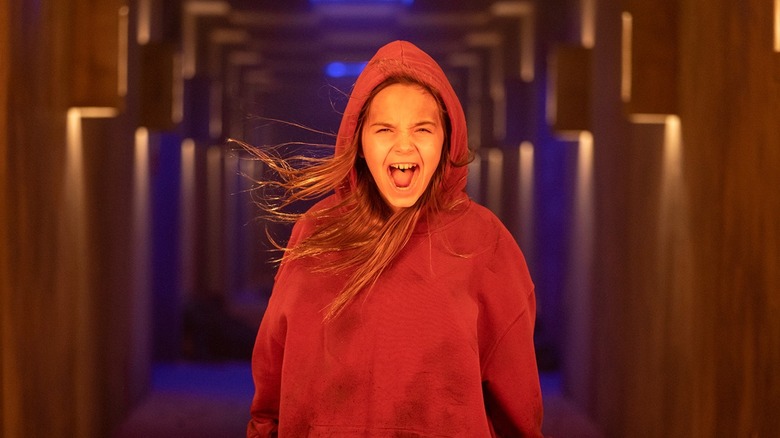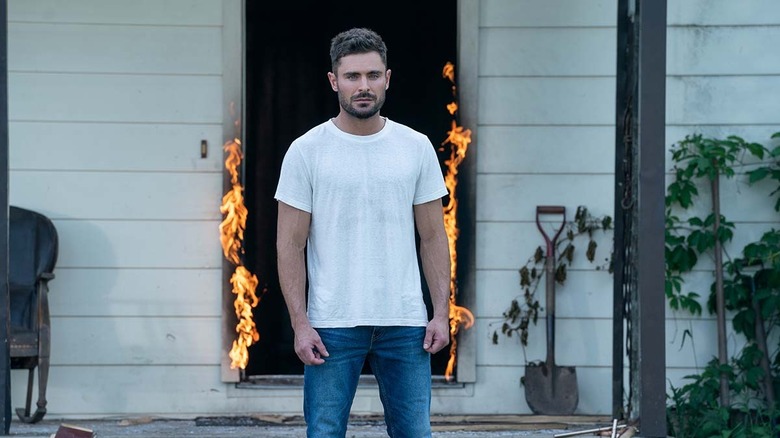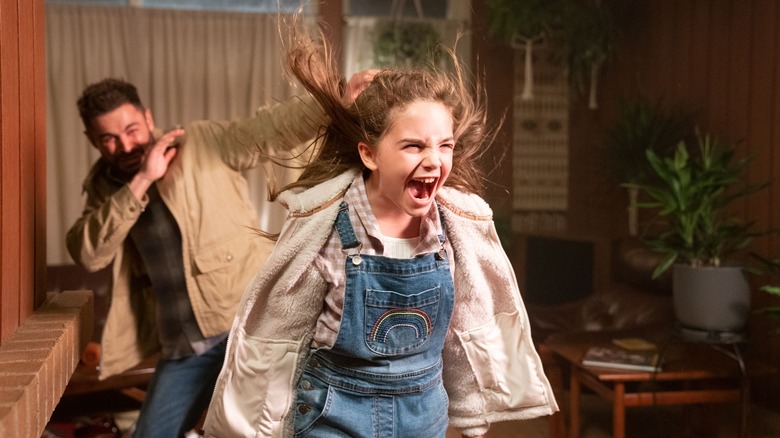Firestarter Director Keith Thomas On Streamlining Stephen King & Starting Some Fires [Interview]
"Firestarter" is one of Stephen King's more medium-sized epics. Still, turning the +500 pages family horror drama into 90-minute thriller is a herculean task. To do so, director Keith Thomas and screenwriter Scott Teems focus largely on the central chase, with Charlie (Ryan Kiera Armstrong) and Andy McGee (Zac Efron) on the run from shadowy government figures. There's a lot of material from the book hinted at and suggested, but for Thomas, he felt the best way to adapt King was simply to get the characters right.
The author himself signed off on the director after seeing Thomas' previous movie, "The Vigil." Now, Thomas doesn't just have the novel and the original film adaptation to live up to, but as he told us, the entire King canon. Ahead of the release of "Firestarter" in theaters, the director talked to us about his experience adapting Stephen King's work, collaborating with composer John Carpenter, and how to make fire character-driven.
'How do we keep this thing moving?'
How'd the story become this compact?
Definitely in the edit, we did play with it a bit. We always wanted it to be more streamlined. A lot of that heavy lifting had been done with Scott Teems before I was on the project. But once I got there, it was kind of like, "Yeah, how do we keep this thing moving?" It's a father-daughter on the run. How do we get to that farm and then get out? How do we get here, get there and streamline some of the stuff? There's lots of great stuff in the book that I love, but we just couldn't find a way to bring it in without getting bloated.
But you do tell the story of Lot Six in the opening credits alone.
That's a good place to hide, that you can hide a lot of the backstory and all that sort of stuff and freak people out. I definitely wanted to take advantage of that. And that was definitely something that we had in mind from the beginning of like, "How do we show Lot Six? Let's bring it in like this."
In the past, visual supervisors have said water and fire are two of the hardest effects to get right. Was that your experience?
I tell you, it's right. Those things they tell you, don't work with animals [or] children, or shoot on water. I guess the one thing we didn't have is a shooting on water, but we had the fire instead. There are definitely challenges when you're trying to make all these pieces work. The other thing, because we'll be judged against the 1984 film, I wanted to have as much practical fire as possible. I wanted these effects to be real and in camera as much as possible. And so, I would say all of our fire scenes involve real fire.
I set fire to our lead actors. At the end sequence, in the film, a big flame thrower sequence, it's enhanced with VFX stuff that you can do now, in terms of clean-up. You can have a lot of safety gear that the audience doesn't see right there and you just clean it up and post. The flames themselves, I wanted to be real. The key to that is just tons of preparation, just getting the right people, making sure everyone's safe. We know what we're doing, everyone's protected. It is kind of letting loose, because fire's unpredictable. You don't know what's going to happen with it.
How character-driven was the fire? Would you say to the crew and VFX team, "This is what Charlie is feeling right now, so we need this fire to help express that"?
Yeah, definitely. They started very early on. How are we going to visually show it? So obviously, you've got all these tools on set, like fans and whatever, practical, simple things that you can do to enhance the atmosphere. But then we spent a lot of time talking about the shimmer that happens in the film when the air heats up and things start to wave and shimmer. We did a lot of practical tests with that.
It wasn't really feasible to shoot it that way, so we ended up kicking that over to VFX and shot a lot of test stuff that they were able to use later. It was about coming up with this visualization of Charlie's powers or maybe Andy's powers in terms of how the audience is going to be able to understand what's happening and how this works.
The other thing I would say is, I was trying to get away from imagery we see in tropes in superhero films, because there's a lot of characters that shoot fire. It's kind of a thing. I wanted to make it much more grounded, much more realistic. If someone was in this room and actually doing this, what would it feel like? What would it look like? What would it sound like? How can we make this as real as possible?
On top of that, a lot of movies have ripped off or homaged "Firestarter."
Yes. 100%. It's been robbed mercilessly since the early '80s, from comics to movies. I mean obviously, "Stranger Things" owes a huge debt to "Firestarter" in terms of the story and the lab, the girl in the lab and the powers, that sort of thing.
'Oh s***, this is a Stephen King movie'
Even though it's more of a cult movie, did the original weigh heavily on your shoulders?
Yeah. I think for me, it took a little while to sink in when we were developing it, that I was like, "Oh s***, this is a Stephen King movie." I'm being judged against the whole canon, the canon of Stephen King films. At a certain point, I had to kind of put that away and had to say, "Okay, I remember what the original did." I know Stephen King didn't really like the 1984 version, so we got room to improve there.
When we got into production, I was like, "Okay, no, I'm not going to be watching 'Stand By Me' and thinking about 'Misery.'" We know what works. I need to make my own film here, and I need to make it in a way that I feel like this tells the story I want to tell without thinking of the wider Stephen King world and the fandom and the reactions.
Since he was going to direct the original adaptation at one point, did you ever ask John Carpenter about his vision for "Firestarter"?
Before my very first call with Carpenter, I had thought about that. What I was most curious about was whether he had written cues for the "Firestarter" film that he didn't make, just because part of his process in developing projects is musical. I thought, "Oh man, what if he busts some of those out if he has them?"
I got into calls with Carpenter and Cody and Daniel, it was really, they're living in the now. It's the now. This 40 years ago, it didn't matter. This is what we have. This is what we're doing. John's a very straightforward, straight shooter guy and just down to earth. Like let's just work. So it never really came up. We didn't get into it. It was more like, "Okay, let's address this score. Let's make this thing sound as great as we can."
He's always kind of moving forward. It's always, you bring something up. So one thing he did ask me is he said, "Of my scores, what do you compare this to?" Like right in our very first conversation, when he's thinking about what the scores should be. I said, "Christine." And he said, "Okay, I got it. I got it. I can do that."
Did you have any conversations with Stephen King?
Stephen King was relatively involved before I got there. I don't know how many versions of the script he had read, but he had certainly read the one that I read when I became attached. And he loved it. He'd also seen my first film "The Vigil" and he had approved me to do this. At that point he was like, he'd signed off. "Good script. I'm okay with this director. Go to town." That was it. I never talked to him personally or had any personal interaction, but he'd given his blessing.
Like you said, you'll be compared against the canon of King adaptations, but since there are so many of them, what lessons did you take away from the canon, in terms of what works and what doesn't about movies based on his work?
I think it all comes down to character, right? Stephen King can come up with some crazy ideas, right? Some really big, outrageous, scary, fascinating ideas. What he really excels at is writing characters that we can relate to and characters we want to follow. The films that I think are most successful as Stephen King films are films where they've followed that, so "Misery," "Stand By Me," and "The Shawshank Redemption," and the "It" films.
It's because they're leaning into those characters that King created and letting the audience discover those characters and come to love those characters. That's why those movies work so well. The scares and all that other stuff, it's almost secondary.
"Firestarter" is now playing in theaters.


